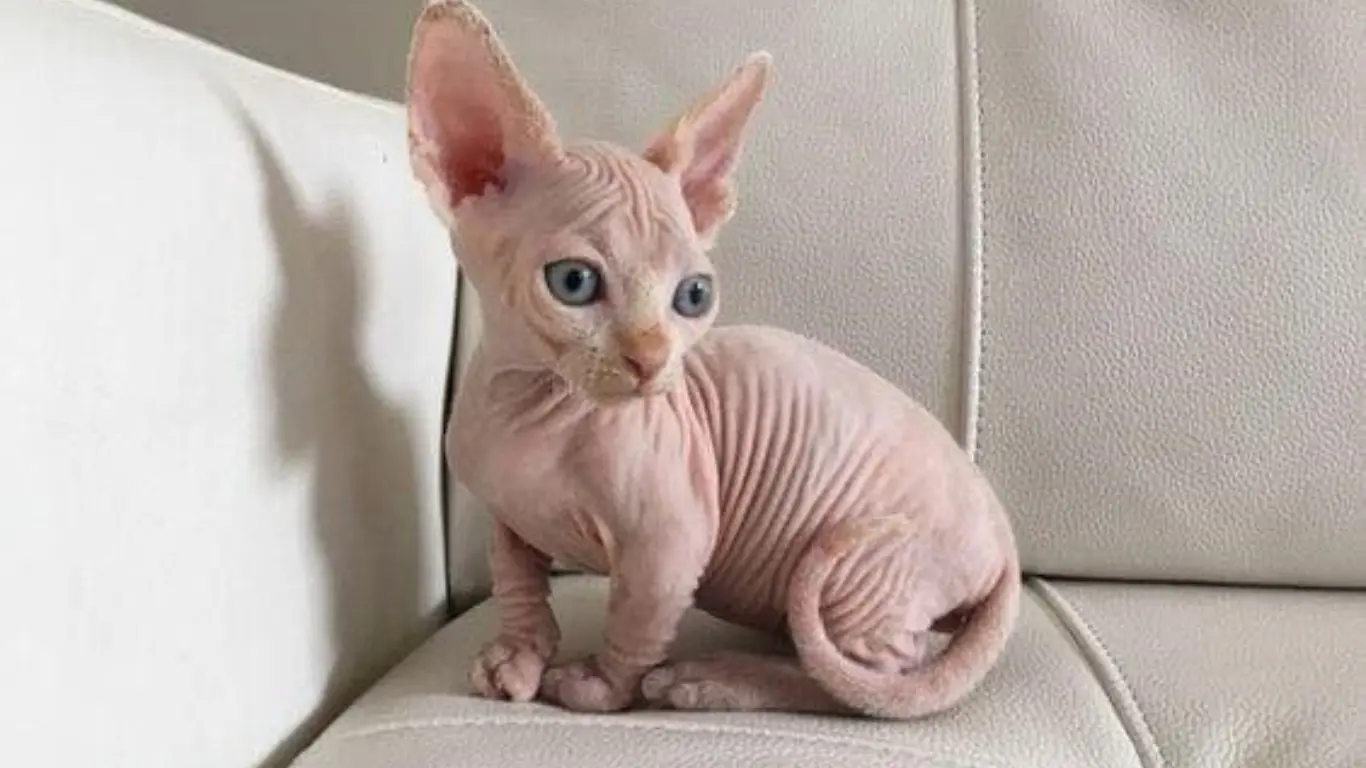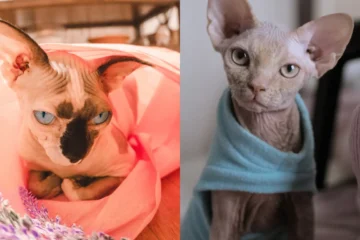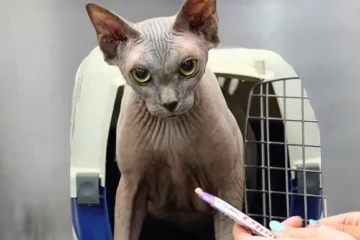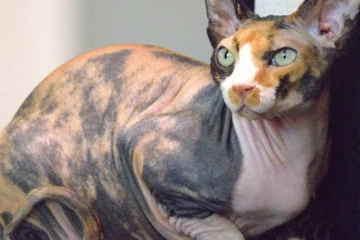The baby Sphynx cat, often simply called a Sphynx kitten, is one of the most distinctive and affectionate pets you can own. These adorable hairless cats are known for their unique appearance, playful nature, and strong attachment to their human families.
In this article, we’ll explore everything you need to know about baby Sphynx cats, including their characteristics, care needs, and what makes them such a beloved breed.
Introduction to Baby Sphynx Cats
The Sphynx cat is famous for its lack of fur, but this breed is much more than its hairless appearance. Originating in the 1960s, the Sphynx breed was developed in Canada through selective breeding. Baby Sphynx cats, with their wrinkly skin, large ears, and expressive eyes, capture the hearts of cat lovers worldwide. These kittens are born with peach-fuzz-like skin and grow into cats that feel warm and soft to the touch.
One of the most common misconceptions about the Sphynx is that they are completely hairless, but many actually have a fine layer of fuzz covering their bodies. This gives their skin a suede-like texture, making them extra cuddly.
Unique Characteristics of Baby Sphynx Cats
Baby Sphynx cats are known for several traits that make them stand out from other cat breeds:
- Hairlessness: The most obvious feature of a baby Sphynx cat is its lack of fur. This hairlessness, due to a genetic mutation, makes them look unique, but it also means they require special care.
- Playful Nature: Sphynx kittens are incredibly playful and full of energy. They love interacting with their owners and other pets, making them a joy to have around.
- Affectionate: Sphynx cats are often described as “Velcro cats” because they love sticking close to their human companions. They are affectionate, loyal, and always looking for warmth—whether it’s in the sun or on your lap.
- Wrinkled Skin: Baby Sphynx cats have charming wrinkles, particularly around their face, legs, and belly. These wrinkles give them an extra dimension of cuteness and a distinctive look.
- Large Ears and Eyes: Their oversized ears and large, almond-shaped eyes are another striking feature that adds to their exotic appearance.
How to Care for a Baby Sphynx Cat
Caring for a baby Sphynx cat involves a bit more effort than caring for a typical kitten, but the reward is a healthy, happy companion. Here are a few essential care tips:
- Keep Them Warm: Without fur, baby Sphynx cats are more sensitive to temperature changes. Ensure your home is warm and cozy, especially during colder months. You may even find your kitten seeking out blankets or a sunny spot in the house.
- Bathe Regularly: Baby Sphynx cats have oily skin, which, in the absence of fur, can lead to a buildup of dirt and oil. Weekly baths are recommended to keep their skin clean and healthy.
- Moisturize: The skin of a Sphynx kitten can sometimes become dry. Using a cat-safe moisturizer can help prevent dry skin and keep them comfortable.
Diet and Nutrition for Baby Sphynx Cats
Like all cats, baby Sphynx kittens need a balanced and nutritious diet. However, because they lack fur, they have a slightly higher metabolism to maintain their body heat, meaning they often need more calories than other breeds.
- High-Quality Food: Choose a premium cat food high in protein to support their growth and energy needs. Wet food or a combination of wet and dry food can also be a good option.
- Hydration: Ensure your baby Sphynx kitten always has access to fresh water. Because of their active nature, they can become dehydrated quickly.
- Supplements: Some Sphynx kittens may benefit from supplements, such as Omega-3 fatty acids, to support their skin health.
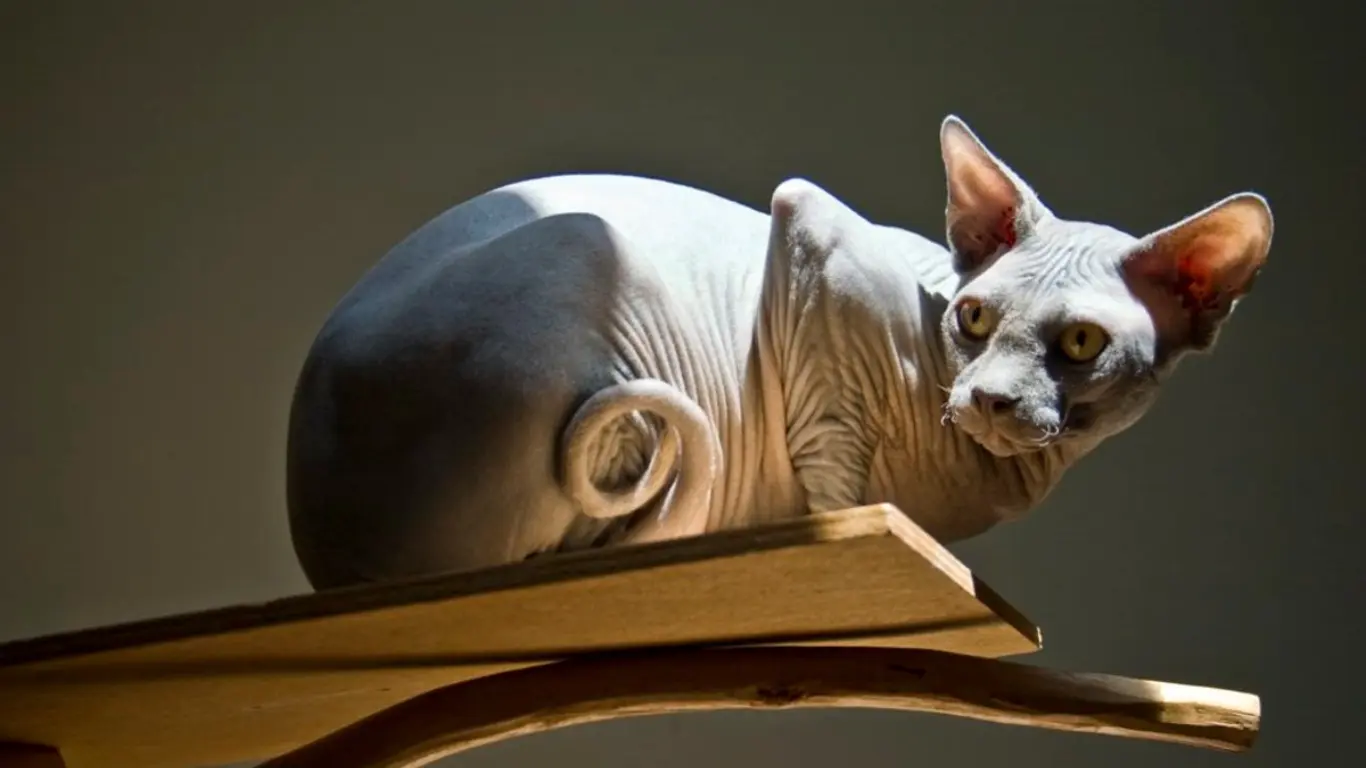
Grooming Requirements for Baby Sphynx Cats
You might think that because Sphynx cats don’t have fur, they don’t need grooming. However, they actually have unique grooming needs:
- Ear Cleaning: Sphynx kittens tend to accumulate earwax faster than other cats, so their ears need to be cleaned regularly with a cat-safe solution.
- Nail Clipping: Their nails also need regular trimming, as they don’t have fur to prevent them from scratching themselves or damaging furniture.
- Skin Care: Regular baths are essential to prevent oil buildup on their skin. Use a gentle, hypoallergenic shampoo that won’t irritate their sensitive skin.
Health Concerns of Baby Sphynx Cats
While generally healthy, the Sphynx breed is prone to certain health issues. When adopting a baby Sphynx cat, it’s essential to be aware of these potential concerns:
- Hypertrophic Cardiomyopathy (HCM): This is a common heart disease in Sphynx cats, which causes thickening of the heart walls. Regular vet check-ups and heart screenings are recommended.
- Skin Issues: Without fur, Sphynx kittens are more prone to skin infections if not bathed regularly. They are also more susceptible to sunburn, so keeping them indoors or protecting them from direct sunlight is important.
- Respiratory Issues: Their lack of fur can make them more vulnerable to cold temperatures, so ensure your home is adequately heated, and avoid exposing them to drafts.
Socialization and Behavior of Baby Sphynx Kittens
Baby Sphynx cats are highly social and thrive on interaction with their human families. They are known to follow their owners around the house, curious and ready for play. If left alone for too long, they may experience separation anxiety, so it’s important to give them plenty of attention.
These kittens are intelligent and can be trained to perform tricks or even walk on a leash. They get along well with other pets and children, making them a perfect addition to a lively household.
Finding a Baby Sphynx Cat for Sale
If you’re interested in welcoming a baby Sphynx cat into your home, it’s crucial to find a reputable breeder. Avoid purchasing from kitten mills or untrustworthy sellers, as these kittens may not be properly cared for or may have genetic health issues.
- Reputable Breeders: Look for breeders who provide health certificates, ensure proper vaccinations, and offer a clean and caring environment for the kittens. A good breeder will also be knowledgeable about the Sphynx breed and be able to answer any questions you may have.
- Adoption: You may also consider adopting a Sphynx kitten from a rescue organization or a shelter. While less common, it’s possible to find these cats available for adoption, and it can be a rewarding experience.
FAQs about Baby Sphynx Cats
How much does a baby Sphynx cat cost?
The price of a baby Sphynx cat can range from $1,500 to $3,000, depending on the breeder, location, and pedigree.
Are baby Sphynx cats hypoallergenic?
Although Sphynx cats don’t have fur, they are not entirely hypoallergenic. They still produce skin oils and dander, which can cause allergic reactions in sensitive individuals.
How long do Sphynx cats live?
With proper care, Sphynx cats have a lifespan of around 12 to 15 years.
Do Sphynx cats need clothes?
In colder climates, some Sphynx cats benefit from wearing sweaters to stay warm. However, clothing should be breathable and not restrict their movement.
Are baby Sphynx cats good with other pets?
Yes, Sphynx kittens are known for their friendly and sociable nature. They generally get along well with other pets, including dogs and cats.
Conclusion
A baby Sphynx cat is more than just a hairless kitten—it’s an affectionate, playful, and loyal companion. Caring for a Sphynx kitten requires attention to their unique needs, such as regular grooming and keeping them warm, but the bond you’ll form with them is unmatched. If you’re looking for a cat that will bring joy, entertainment, and love to your home, the baby Sphynx is an excellent choice.

